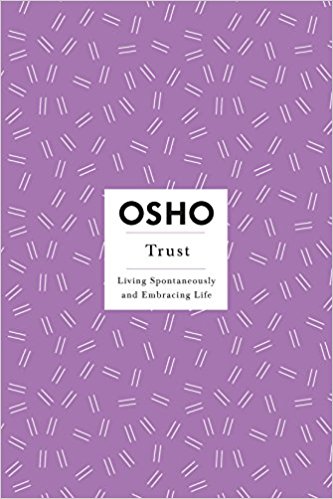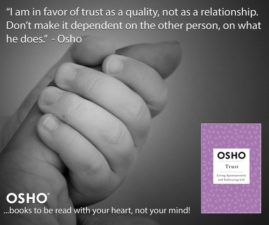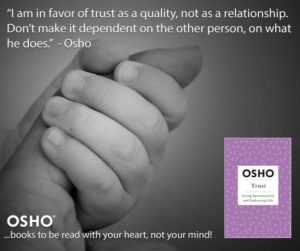Living Spontaneously and Embracing Life

Whereas authentic trust comes from within, belief systems are imposed from the outside by religious and social institutions. Osho encourages readers to rediscover and reclaim the innate trust that is born with each individual. No more demands to trust in an “other.” No more faith and belief, with their demands that we drop all questioning and doubt, but rather a willingness to honor our questions and doubts so fully that they will lead us to our unique, authentic, and individual truth.
Finding out our own Truths
In Trust: Living Spontaneously and Embracing Life, one of the greatest spiritual teachers of the twentieth century discusses the importance of believing in our own ideals and truths—and not give in to the powerful societal influences that govern the world.
We live in times where trust in old institutions and their relevance to our lives have evaporated. Religions, ideologies, political systems, morals, family, marriages—none of these traditional institutions are working anymore. Osho’s insight is that the institutions of the past have used the false substitutes of “belief” and “faith” as control mechanisms of society. Whereas authentic trust comes from within, belief systems are imposed from the outside by religious and social institutions.
Rediscovering and Reclaiming Innate Trust
Osho encourages readers to rediscover and reclaim the innate trust that is born with each individual. No more demands to trust in an “other.” No more faith and belief, with their demands that we drop all questioning and doubt, but rather a willingness to honor our questions and doubts so fully that they will lead us to our unique, authentic, and individual truth.
Osho challenges readers to examine and break free of the conditioned belief systems and prejudices that limit their capacity to enjoy life in all its richness. He has been described by the Sunday Times of London as one of the “1000 Makers of the 20th Century” and by Sunday Mid-Day (India) as one of the ten people—along with Gandhi, Nehru, and Buddha—who have changed the destiny of India. Since his death in 1990, the influence of his teachings continues to expand, reaching seekers of all ages in virtually every country of the world.

TRUST Living Spontaneously and Embracing Life
Het boek “Trust Living Spontaneously”, verschenen in 2017, gaat over het vertrouwen dat in deze tijd meer dan ooit lijkt te ontbreken bij mensen. Gezien de heftige en indringende gebeurtenissen die plaatsgevonden heen en plaatsvinden, lijkt dat niet echt verwonderlijk.
Toch zegt Osho: “Waarom kun je geen vertrouwen hebben? Het hele bestaan verkeert in vertrouwen.
Bomen worden nooit neurotisch, vogels en andere dieren raken niet psychotisch.”
Vertrouwen is een Individuele Kwaliteit
 We worden uitgenodigd om aan het bijzondere experiment deel te nemen dat leven heet en dat in een overvloedige staat is. Want alles wat we nodig hebben, is rondom ons beschikbaar: voedsel, water, lucht, energie en waardevolle materialen bevinden zich om ons heen. Wat is dus het probleem? Waarom is ‘vertrouwen’ eigelijk een punt?
We worden uitgenodigd om aan het bijzondere experiment deel te nemen dat leven heet en dat in een overvloedige staat is. Want alles wat we nodig hebben, is rondom ons beschikbaar: voedsel, water, lucht, energie en waardevolle materialen bevinden zich om ons heen. Wat is dus het probleem? Waarom is ‘vertrouwen’ eigelijk een punt?
Osho geeft in het boek “Trust Living Spontaneously” aan hoe het aangeboren vertrouwen in feite bedorven is door de instituties die mensen onwaarheid voorgespiegeld hebben.
Vertrouwen wankelt in onze tijd
We leven in tijden waarin het vertrouwen in oude instituties en de relevantie die ze voor ons leven hebben, verdampt zijn. Religies, ideologieën, politieke systemen, moraal, het gezin en huwelijken – geen van deze traditionele instituties werkt meer. Osho’s inzicht is dat de instituties uit het verleden de valse vervangingen voor ‘geloof’ en ‘geloofssysteem’ als controlemechanismen voor de maatschappij hebben gebruikt. Terwijl authentiek vertrouwen van binnen komt, worden geloofssystemen van buitenaf opgelegd door religies en sociale instituties. Osho moedigt de lezers aan om het aangeboren vertrouwen dat in ieder individu ontstaan is, opnieuw te ontdekken en te herwinnen. Geen opdrachten meer om in een “ander” te vertrouwen. Geen geloof en geloofssysteem meer met daaraan de eis verbonden dat we elke vraag en twijfel laten vallen, maar eerder een bereidheid om onze vragen en twijfel zo volledig te honoreren dat zij tot onze unieke, authentieke en individuele waarheid leiden.
In het boek ‘Trust Living Spontaneously’ komen de volgende thema’s onder meer aan de orde:
• Wat is Vertrouwen? Met als accenten: geloof is een gegeven, vertrouwen betekent groei.
Twijfel is onze vriend.
• Vertrouwen is een kwaliteit, zij is niet afhankelijk van een persoon.
• Zonder geloof leven, getuigt van veel durf
• Veiligheid is de grootste illusie
• Bind eerst je kameel vast, met het bijzondere verhaal dat met deze uitspraak verbonden is.
Het boek ‘Trust’ Living Spontaneously maakt onderdeel uit van de serie ‘Insights for a new way of Living’.
Het boek ‘Trust Living Spontaneously’ is te bestellen via de boekhandel.
Impression of Trust Living Spontaneously
In Trust, the eleventh volume in the Insights for a New Way of Living series, Osho helps readers re-evaluate the idea of trust. We live in times where trust in old institutions and their relevance to our lives have evaporated. Religions, ideologies, political systems, morals, family, marriages―none of these traditional institutions are working anymore. Osho’s insight is that the institutions of the past have used the false substitutes of “belief” and “faith” as control mechanisms of society. Whereas authentic trust comes from within, belief systems are imposed from the outside by religious and social institutions. Osho encourages readers to rediscover and reclaim the innate trust that is born with each individual. No more demands to trust in an “other.” No more faith and belief, with their demands that we drop all questioning and doubt, but rather a willingness to honor our questions and doubts so fully that they will lead us to our unique, authentic, and individual truth.